Unit3 Inventors and Inventions
高考英语 Unit 3 Inventors and inventions 【高考复习课件】
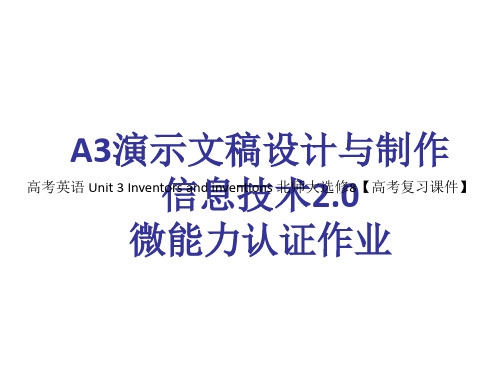
用本单元所学单词及用法完成下列句子
1.这台机器把石头碾成粉末。 The machine pounds the stones into _p_o_w__d_er_. 2.这项专利期限为三年。 The _p_a_t_en_t_ runs out in three years' time. 3.你能分辨这对双胞胎吗? Can you _d_is_t_in_g_u_i_s_h_ the twins apart? 4.他个性消极。 He has a _p_a_s_s_iv_e_ disposition.
用本单元所学短语及用法完成下列句子
1.他们到达办公室很快就开始他们的工作了。 No sooner had they got to the office than they _s_e_t_a_b_o_u_t their work. 2.电话占线,所以我打不通经理的电话。 The line is always engaged, so I can't _g_e_t_t_h_ro_u_g_h_to the manager. 3.美餐一顿后,他们开始去爬这座山的山顶。 Having had a good meal, they _s_e_t_o_u_t_ to climb to the top of the mountain. 4.杰克差点掉下悬崖,但是他成功地挂住直到救援到来。 Jack almost fell off the cliff, but managed to_h_a_n_g__o_n_until help came.
运用 用适当的介词或副词填空
(1)Human Rights groups are calling _f_o_r the release of political prisoners.
高中英语《Unit3 Inventors and inventions》优质教学课件

Stage 6 (8): Applying for a patent
How long will you wait for your patent application to be published ?
A. For one and a half years B. For about 500 days C. For 80 months D. For two years
attempt ,but used a small net _a_s (catch) the
passive animals. And all went planned.
At last, pressed by my friends and relations, I
have filled iwnitth form and filed my patent
application the Patent Office.
Part IV: Discussion
1).Do you want to be an inventor?
2).Find words as many as possible to describe
an inventor.
?
determined
Stage 4 (4-6) : Testing the solution
The way of catching the snakes: Firstly , place the frozen bowl over the
snakes’ habitat and ice-cubes on top of the bowl to keep it cool.
2).The six stages an inventor must go through.
Unit 3 Inventors and inventions

• distinguish (1)vi.& vt.辨别;显示……的差别 You should learn to distinguish between right and wrong. 你应学会明辨是非。 The twins are so alike that no one can distinguish one from the other.这对孪生儿长 得很像,没有人能分辨得出哪个是哪个。
• Ⅱ.重点短语扫描 1.call 给……打电话 2.now then 偶尔;有时 3.set 开始;着手 4.dive 迅速把手伸入;一心投入 5.set (to do) 开始(做) 6. on 不挂断;稍等;紧紧握住 7.out of 次序颠倒;发生故障 8.get 设法联系上(尤指打通电话); (设法)做完;通过
• 【解析】 “如果你方便的话”应用if it is convenient to/for you。 【答案】 C
• bear (bore,borne)vt. (1)负担,承担 I doubt if that chair will bear your weight. 我怀疑那把椅子能否承受得了你的体重。 Who will bear the responsibility/expense? 谁要负担这责任/费用呢? (2)忍受,忍耐 He can’t bear being laughed at. =He can’t bear to be laughed at. 他无法忍受遭人嘲笑。
Unit 3 Inventors and inventions
• Ⅰ.重要单词聚焦 1. n. 专利,证书,专利权 2. vi.& vt. 显示……的差别;使……有所 不同;辨别 3. n. 产品 4. adj. 突然的;意外的 5. adj. 便利的;方便的;就近的 6. n. 小心;谨慎 7. n. 预料;期待;期望
高考英语一轮复习话题38发明家与发明(Unit3Inventorsandinventions)新人教

话题38 创造家与创造〔Unit 3 Inventors and inventions〕晨读背诵根底知识自测一、单词拓展(A)根据音标及词义写出英文单词。1.distinguish [dɪˈstɪŋɡwɪʃ] vi. & vt.显示……差异;使……有所不同;区分2.merciful [ˈmɜːsɪfʊl] adj.宽大;仁慈;慈悲→mercy [ˈmɜːsɪ] n.宽大;仁慈3.product [ˈprɒdʌkt] n.产品4.abrupt [əˈbrʌpt] adj.突然;意外→abruptly [ә'brʌptlɪ] adv.突然地,唐突地5.convenient [kənˈviːnɪənt] adj.便利,方便,就近→convenience [kənˈviːnɪəns] n.方便,便利→conveniently [kənˈviːnɪəntlɪ]adv.便利地,方便地6.caution [ˈkɔ:ʃən] n.小心,慎重→cautious [ˈkɔ:ʃəs] adj.小心,慎重→cautiously[ˈkɔ:ʃəslɪ] adv.小心地,慎重地7.passive [ˈpæsɪv] adj.被动;消极;被动语态8.seize [si:z] vt.抓住;捉住;夺9.file [faɪl] n.文件;档案;文件夹vt.提交;将……归档10.freezing [friːzɪŋ] adj.冰冻;严寒→freeze [friːz] v.冰冻11.innocent [ˈɪnəsənt] adj.清白;无罪;天真→innocence [ˈɪnəsəns] n.天真,清白12.bear [beə(r)] vt.忍受;忍耐;负担13.tap [tæp] vt.轻打;轻拍;轻敲n.轻轻地敲击(声);(水)龙头14.current [ˈkʌrənt] n.(水或气)流;电流adj.现在;当前15.stable [ˈsteɪb(ə)l] adj.稳固;稳定;安定16.associate [əˈsəʊʃɪeɪt] vt.联想;联系n.同伴,伙伴17.practical [ˈpræktɪk(ə)l] adj.实际;实践;实用18 petence [ˈkɒmpətəns] n.能力;胜任;本领(B)单词活用用所给词正确形式填空。1. I’m sorry, but I don’t know there is an abrupt ( abruptly)change of plan.2. As expected (expect), the sales manager gave in his notice at work today.3. We should try our best to put the enemy in a passive ( passive) position.4. As we all know, newspapers influence the current ( currently) of thought.5. I have heard two versions (version) of the accident.6.It’s freezing (freeze) outside. You’d better put on more clothes. 7.Your invention is ingenious, but not very practical (practice).8.I keep my reference books near my desk for convenience (convenient).二、短语互译及运用(A)短语互译1.call up 给……打2.now and then 偶尔;有时3.set about 开场;着手4.dive into 迅速把手伸入;一心投入5.set out (to do) 开场(做)6.hang on 不挂断;稍等;紧紧握住7.out of order 次序颠倒;发生故障8.get through 设法联系上(尤指打通);(设法)做完;通过9.ring back 回复10.ring off 挂断(B)灵活运用选择以上恰当词组填空。1. The poor girl has gone through such a lot since her parents died.2. Do be careful with those fireworks; the slightest spark could set them off.3. These old photos called up childhood memories.4. I set out to knit(编织) a sweater but in the end it became a vest.5. He's not in; why don't you ring back after 6 o'clock6. He takes my sister out to the theatre now and then.7. My clock is out of order and waked me up at 3 this morning.三、课文语法填空When I called up my mother in the countryside 1 the telephone she was upset. There were some snakes in the courtyard 2 came near the house now and then. I think here was a chance for me to distinguish 3 by inventing something to catch the snakes 4 I set about working on some approaches. Finally I came up with an easy 5 convenient way: I put a bowl with some ice-cubes in it 6 the snakes’ habitat to make them sleepy, then I used a small net 7 (collect) the passive snakes and the next day I merrily released them all back 8 the wild. I was satisfied with my invention that I decided to seize the opportunity to apply 9 a patent. So I sent my invention to the patent office to get recognition. And 10 after I have had the recognition can I say that I am truly an inventor.【答案】1. on 2. which/ that 3. myself 4. so 5. and 6. over 7. to collect 8. into 9. for 10. only重点词汇精讲精练1. distinguish vt.区分;识别;〔常与from, between连用〕区别;区分背诵The man distinguishes himself by his wisdom这个人因智慧而扬名。
课件1:Unit 3 Inventors and inventions

bear(bore,borne) vt.忍受;忍耐;负担;生育
01
忍受做某事
02
bear/stand/tolerate doing
容忍某事
03
put up with sth.
禁止……
04
bear/keep sth.in mind
禁止某人做……
bear a heavy burden
巧学活用
(1)用括号内词的适当形式填空 —Why did Bob cry? —He couldn’t bear__b_e_i_n_g_m__a_d_e___(make) fun of like that before the whole class. (2)完成句子 我们应该牢记,很多事故都是由酒后驾驶造成的。 We should always__b_e_a_r_/k_e_e_p__in__m__in_d__t_h_a_t _many traffic accidents arise from drunk driving.
(1)用适当的介词填空 ①I keep my reference books near my
desk____fo_r___convenience. ②Will it be convenient____f_o_r__you to start work
tomorrow? ③Please send me an answer____a_t___your convenience. (2)用括号内词的适当形式填空 Thanks to the popularity of__c_o_n_v_e_n_ie_n_c_e_stores,we can buy daily necessities_c_o_n_v_e_n_i_e_n_tl_y___.(convenient)
高考英语一轮复习Unit3Inventorsandinventions课件新人教版选修8

-11-
Ⅰ.单词 由简到难,水到渠成 The first step is as good as half over. 【识记】 1.beaten track 被踩出来的路;常规;惯例 2.dive into 迅速把手伸入;一心投入 【默写】 1.不挂断;稍等;紧紧握住 hang on 2.挂断电话 ring off 3.给……打电话 call up 4.偶尔;有时 now and then 5.开始;着手 set about 6.开始(做) set out(to do) 7.次序颠倒;发生故障 out of order 8.设法联系上(尤指打通电话);(设法)做完;通过 get through 9.回复电话 ring back
(2)A well-written composition calls for a good choice
of
words and clear organization among other things. 一篇好的作文还需要选词准确,结构清晰。
(3)Had I known his telephone number,I would have called him up . 如果我知道他的电话,早打电话给他了。
Unit 3 Inventors and inventions
-2-
Ⅰ.单词 由简到难,水到渠成 The first step is as good as half over. 【识记阅读单词】 1.patent n. 专利证书;专利权 2.courtyard n. 院子;庭院;天井 3.walnut n. 胡桃;胡桃木 4.product n. 产品 5.powder n. 粉末;火药 6.perfume n. 香水;香味 7.stainless adj. 无锈的;不锈的;没有污点的 8.passive adj. 被动的;消极的;被动语态的 9.criterion n. (评判的)标准;尺度 10.valid adj. 有效的;确凿的 11.string n. 线;绳子;一串
高中英语选修8 Unit 3 Inventors and inventions-单元教案
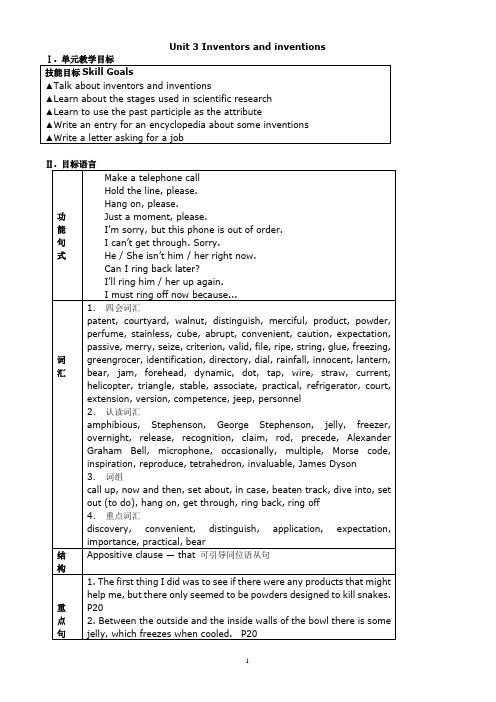
Unit 3 Inventors and inventionsⅢ. 教材分析和教材重组1. 教材分析本单元以Inventors and inventions为话题,旨在通过单元教学,使学生了解发明和发现的区别,了解发明创造的过程和获得专利的条件,学习发明家的成功事例;能灵活运用基础句型描述中外古代和现代发明,谈论不同发明的优缺点及其现实意义;根据不同问题及条件设计、改进发明并阐述自己的观点;能写一封有创新的求职申请,阐述自己的特长和优势,能对别人的发明、创造或观点提出意见或建议;并能运用所学知识利用现实生活中有限材料进行发明创造。
1.1 Warming Up 提供了三幅不同发明或发现的图片,让学生运用已有的知识和经验,区分发明和发现的不同含义;并能与同伴合作描述现代发明在现实生活中的作用。
1.2 Pre-reading要求学生将课本所列关于进行科学研究或发明创造所必须经历的几个阶段(步骤或过程)进行正确的排序。
了解每一项发明在得到社会承认前都必须经历一个过程。
1.3 Reading是一篇记叙性的文章。
作者在文中详细介绍了从发现问题(snake trouble)、分析问题(products that might help)到解决问题(remove the snakes)的全过程,并介绍了专利申请方面的一些知识。
1.4 Comprehending第一个训练题要求学生根据课文内容回答问题;第三个训练题要求学生运用科学步骤设计一项发明解决课本所提供的三个问题,并与同学交流观点。
1.5 Learning about Language分两部分。
第一部分要求学生利用填空、改写句子的方式复习所学词汇及表达法。
第二部分重点练习过去分词作定语的用法。
1.6 Using Language分成四部分。
第一部分Reading要求学生阅读一篇介绍发明家Alexander Graham Bell的文章并回答有关问题,了解电话发明者贝尔的发明及其成功的原因。
人教版高中英语选修八 Unit3 Inventors and inventions-语法篇(教师版)

第6讲Inventors and inventions 语法篇____________________________________________________________________________________________________________________________________________________________________1.掌握动词过去分词的用法和功能;2.可以纯熟运用非谓语中的动词的过去分词。
一. 概述:分词分为如今分词和过去分词。
在句中作定语、状语、表语和宾语补足语。
(一). 分词的作用:1、作定语(1)单个分词作定语,分词前置。
如:The sleeping boy is my son.The excited people rushed into the building.A lost opportunity never returns.He is a retired worker.(2)分词短语作定语,分词后置;分词修饰不定代词something等要后置;个别分词如give,left等作定语也后置。
如:The girl standing under the tree is my niece.The building built last year is our library.This is the question given.There is nothing interesting.(3)过去分词作定语与其修饰的词是被动关系,相当于一个被动语态的定语从句。
如:Most of the people invited to the party were famous scientists2、作表语如今分词作表语多表示主语具有的特征,过去分词作表语多指主语所处的状态。
如:The film is touching.The glass is broken.She looked tired with cooking.He remained standing beside the table.3、作宾语补足语分词和不定式一样,在一些感官动词或使役动词后作宾语补足语。
英语:选修8-unit3-inventors-and-inventions单词讲解课件(新人教版)

5. call up 打电话, 使…回忆起 今晚我会给你打电话。 I’ll call you up tonight. (ring sb. up) 老相片引起了我对童年的回忆。 The old photo calls up memories of my childhood. 【归纳拓展】 call back 召唤某人回来; 再访; 回电话 call for 需要, 要求, 接(人或物) call in 邀请; 请来 call on 拜访(人) call at 拜访(某地)
2) (常与from, between连用) 区别; 区分 distinguish A from B 把A与B加以分开 distinguish between A and B 辨别A和B 你能区分那两个物体吗? Can you distinguish between those two objects? 应当教育孩子分辨好坏。 Children should be taught to distinguish right from wrong. distinguish oneself 显扬自己, 使自己扬名 e.g. The man distinguished himself by his wisdom. 此人因其聪明才智而名声在外。 How could you possibly distinguish yourself if you are not willing to study hard? 如果你不愿意努力学习,你怎么能使自己出众呢?
3.Convenient
sthbe convenient for sb/sth 对某人/某物方便、便利的 It is convenient for sb to do sth 对于某人来说做某事 是方便的 三点钟对你方便吗?
高中英语人教版 选修8 Unit3Inventors and inventions--过去分词的用法

5) Mr. Smith,____ of the speech, started to read a ____ novel. (2003 北京春) A. tired, boring B. tiring, bored
C. tired, bored
D. tiring, boring
二、动词-ed形式作表语
他们认为这问题解决了。
(2) 动词-ed形式可作使役动词的宾语补足 语, 这类动词包括make, get, have, keep, leave, hold等。 I have my hair cut once a month.
我每个月理一次发。
He was trying to make himself understood.
作表语的-ed形式可被much, very, quite等 所修饰。
I was very pleased at the news.
听了这消息我很高兴。
He grew much tired of the work.
他十分厌倦这工作。
He seemed quite delighted at the idea.
3) The pilot asked all the passengers on board to remain ____ as the plane was making a landing. (2004 上海) A. seat B. seating C. seated D. to be seating
人们发现那女孩被打得青一块紫一块。 (主语补足语)
(1)动词-ed形式可作表示感觉和心理状态的
动词的宾语补足语,这类动词包括see, hear,
watch, notice, feel, find, think, suppose, consider等。 We thought the game lost.
Unit 3 Inventors and inventions(附详细解析)新人教版选修8

选修8 Unit 3 Inventors and inventionsⅠ. 单词拼写1. I’m sorry, but I don’t know there is an (突然的) change of the plan.2. As (预料), the sales manager gave in his notice at work today.3. It’s our (期望) that you will do well.4. We should try our best to put the enemy in a (被动的) position.5. As we all know, newspapers influence the (潮流) of thought.6. Your books and magazines are almost in a m ; go and put them in order.7. The football club c arranges all the matches.8. I have heard two v of the accident.9. Illness is a v excuse for being absent from work.10. She t me on the shoulder, but I didn’t feel it.Ⅱ. 用方框内所给短语的适当形式填空1. The poor girl has such a lot since her parents died.2. Do be careful with those fireworks; the slightest spark could them .3. The football match was because of the heavy rain.4. These old photos my childhood memories.5. I to knit(编织) a sweater but in the end it became a vest.Ⅲ. 翻译句子1. 这一家人搬走了,因为这里经常交通堵塞,孩子上学不方便。
人教版新课标高二英语下册选修八第三单元Inventors and inventions 单词课件(共
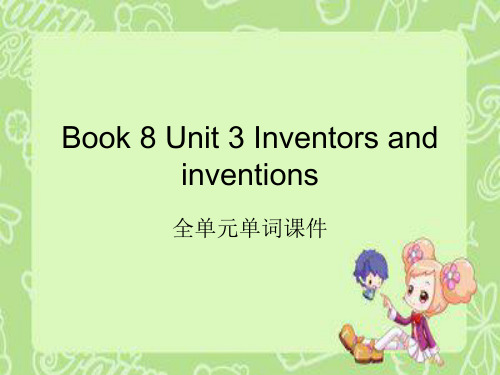
• 17.caution n.小心谨慎v警告;提醒 • n.谨慎,警告 • He is a man of caution.财政大臣是个谨慎的人。 • for caution’s sake为谨慎起见 • with caution 小心翼翼地 • give sb a caution给某人警告 • vt. caution sb against sth警告某人提防某事
• 3.call up给……打电话,使想起,使回忆起
• My dad called me up to tell me the good news.
• She can still call up scenes of childhood. • 和call有关的短语 • call for 需要,呼吁,要求 call back回电话 • call off取消 call out召唤出动,下令罢工 call on拜访(=drop in on sb=pay a visit to sb) ,号召 • call on sb to do sth号召某人做某事 • 有关电话的短语 • ring/call back回电话 • ring off挂断电话 • give sb a ring给某人打电话 • sb be wanted on the phone有某人的电话 • answer the phone接电话 • hang on /hold on不挂断,稍等一下
Book 8 Unit 3 Inventors and inventions
全单元单词课件
• 1. amphibious adj.两栖的 • amphibious vehicles水路两栖用车 • amphibious tank两栖坦克 • amphibian n.两栖动物,水路两用车 • 2. patent n.专利证书,专利权vt.给予专利权
人教版高中英语选修八(Book 8 Unit 3)
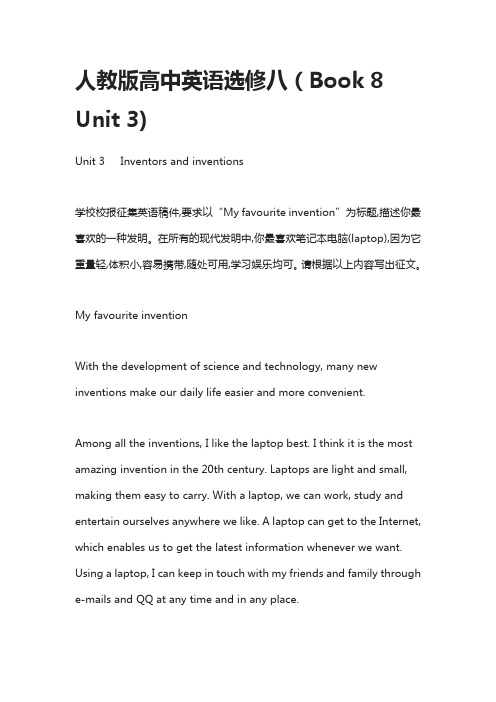
人教版高中英语选修八(Book 8 Unit 3)Unit 3 Inventors and inventions学校校报征集英语稿件,要求以“My favourite invention”为标题,描述你最喜欢的一种发明。
在所有的现代发明中,你最喜欢笔记本电脑(laptop),因为它重量轻,体积小,容易携带,随处可用,学习娱乐均可。
请根据以上内容写出征文。
My favourite inventionWith the development of science and technology, many new inventions make our daily life easier and more convenient.Among all the inventions, I like the laptop best. I think it is the most amazing invention in the 20th century. Laptops are light and small, making them easy to carry. With a laptop, we can work, study and entertain ourselves anywhere we like. A laptop can get to the Internet, which enables us to get the latest information whenever we want. Using a laptop, I can keep in touch with my friends and family through e-mails and QQ at any time and in any place.I think in the future, everybody will have his or her own laptop.1.文章体裁:说明文。
高考英语第一轮单元知识点复习导学案30(选修八_unit_inventors_and_inventions)

选修八Unit 3Inventors and inventionsⅠ.单词—在语境中默写,在联想中积累1.passive的;消极的;被动语态的2.seize v t. 抓住;捉住;夺3.forehead n. 额头4.associate v t. 联想;联系n. 同伴;伙伴5.criterion n. (评判的)标准;尺度6.bear v t. 忍受;忍耐;负担7.distinguish v i.&v t显示……的差别;使……有所不同;辨别→distinguished adj.著名的;卓越的8.merciful adj.宽大的;用所给词的适当形式填空1.Please give himlots of love insteadof high expectations(expect); otherwisehe will be loadedwith great pressure.2.The bus came toan abrupt (abruptly)stop, making manypassengers fall offtheir seats.3.When the ice isheated abovefreezing (freeze)point, it begins tochange into a liquidstate.4.Your suggestionsounds reasonableand practical锦①active主动的②passive 被动的③positive 积极的④negative 消极的⑤subjective 主观的⑥expensive 昂贵的⑦impressive 印象深刻的⑧aggressive 争强好胜的;挑衅的2.表示“抓住”的相关词语一览①seize v t. 抓住;捉住②catch v t. 抓住;接住仁慈的;慈悲的→merciless adj.残忍的;无情的→mercy n.宽恕;仁慈9.convenient adj.便利的;方便的;就近的→convenience n.方便;便利→conveniently_ad v.便利地;方便地10.caution n.小心;谨慎→cautious_adj.小心的;谨慎的→cautiously_ ad v.小心地;谨慎地petence n.能力;胜任;本领→competent adj.能胜任的;有能力的;称职的12.abrupt adj.突然的;意外的→abruptly ad v.突然地13.practical adj.实际的;实践的;实用的→practice n.实践;练习→impractical adj.不明智的;不现实的14.expectation n.预料;(practice). I think itdeserves to bediscussed at the nextmeeting.5.He took measuresto make up his fault,which received ourrecognition(recognize).6.You can visitProfessor Li when itis convenient,_thatis, at hisconvenience. Hishouse isconveniently nearthe busstop.(convenient)7.He is a cautiousman and is alwaysdoing things withcaution. You shouldget on with himcautiously.(caution)8.The merciless kingshowed no mercyand killed all theprisoners.(merciful)③grasp v t. 抓住;掌握④catch hold of 抓住⑤get hold of 抓住3.含fore-前缀的单词面面观①forehead n. 额头②forecast v t. 预报③foresee v t. 预见④foreword n. 前言⑤forearm n. 前臂4.“辨别;区分”家族①distinguishbetween ...and ...区分……和……②distinguish ...from ...使……有别于……③tell ... from ...区分/辨别……和……期待;期望→expect_v.预料;期待;期望;认为15.innocent adj.清白的;天真的→innocence_n.天真;清白16.recognition n.认出;认可;承认→recognizev t.认出;识别;承认17.freezing adj.冰冻的;严寒的→freeze v.冰冻→frozen adj.冻结的18.occasionally ad v.偶然地;不时地→occasionaladj.偶然的→occasionn.时机;机会;场合Ⅱ.短语—在应用中记牢,在归纳中记多1.call_up给……打电话;使想起2.now_and_then 偶尔;有时3.set_about 开始;着手4.dive_into 迅速把手伸入;一心投入5.set_out_(to_do)开始(做)6.hang_on 不挂断;稍等;紧紧握住7.out_of_order 次序颠倒;发生故障8.get_through 设法联系上(尤指打通电话);(设法)做完;通过;度过9.ring_back 回复电话10.ring_off 挂断电话选用左栏短语填空1.Sorry to hear thatyou’ve failed theexam. If only youhad set_about therevision earlier.2.Many memories ofold timeswere_called_up bythe conversation wehad together thatevening.3.The engines of theship wereout_of_order andthe bad weatheradded to thehelplessness of thecrew at sea.4.The girl goes tovisit her Englishteachernow_and_then whoretired from schoollast year.5.It’s the love andresponsibility thathave driven him toget_through manyhardships and1.“有时”词汇全接触①now and then偶尔;有时②now and again不时;时而③from time to time不时④sometimes 有时⑤occasionally 偶尔2.“v.+into”结构的短语荟萃①dive into 迅速把手伸入;一心投入②burst into 突然闯入③run into 撞上;偶然遇见④look into 往里看;调查⑤knock into 撞上⑥break into 破门而入survive.Ⅲ.句式—在解读中学懂,在仿写中学通strict that it is difficultto get new ideas accepted unless they are truly novel.(评定)专利标准是很严格的,除非新的想法真是新颖的,否则很难被接受。
高中英语Unit 3Inventors and inventions—Section3语言应用

合
· 核
communicate with others
Unit 3 Inventors and inventions
基
础
梳 理
[句型结构]
·
新
知
落 实
1.Every time you do you will be certain to find 综
合
something...
训 练
[公式] every time引导时间状语从句。
· 能
知 识 整
力
[仿写] 他每次从国外来,我都到机场迎接他。
理
· 新
adj. 现在的;当前的
知 落
__c_u_r_r_e_n_t_ly___ adv. 通常;现在
实
综
11.__st_a_b_l_e__ adj. 稳固的;稳定的;安定的
合 训
练
_s_t_a_b_i_li_ty__ n.
稳定;安定
· 能
知 识
12.__a_s_so_c_i_a_te__ vt. 联想;联系
能 力 提 升
合
· 核
__o_c_c_a_si_o_n_a_l__ adj. 非经常的;偶尔的
心
突 破
__o_c_c_a_s_io_n____ n. 场合;时刻;机会
菜单
英语·选修8
Unit 3 Inventors and inventions
基
础 梳
10.___cu__rr_e_n_t__ n. (水或气)流;电流
理
·
新 spirits that led to his famous invention.
知
落 实
[公式] 此句为强调句。It is/was+被强调部分+ 综
Unit 3 Inventors and inventions知识讲解 Unit 3 Inventors and inventions语言点.doc

Unit 3 Inventors and inventions语言点编稿:牛新阁审稿:王春霞学习目标重点词汇distinguish,convenient, expectation, seize, valid,bear, tap, current, associate practical重点短语now and then,set out (to do), set about, call up,hang on, get through,out of order, dive into, ring back/ ring off重点句型从when cooled说开来only引出的倒装结构知识讲解重点词汇distinguish【原句回放】Here was a chance for me to distinguish myself by inventing something merciful that would catch snakes but not harm them. 这次我有机会来表现一下自己了,我要发明某种仁慈的东西,既可以把蛇捉住,而又不会伤害它们。
【点拨】distinguish vt.& vi.辨别,区别;显示......的差别;使......有所不同常用搭配:distinguish ... from ... 把......与.....加以区分distinguish between ... and... 把......与.....加以区分distinguish oneself 使自己与众不同; 使自己扬名distinguish sb. by ... 凭借......辨认某人I can distinguish them at a distance. 我在远处能够辨认出他们。
Can you distinguish between those two objects? 你能区分那两个物体吗?Speech distinguishes man from the animals. 说话的能力把人与动物区别开来。
高中英语 Unit 3 Inventors and inventions 贝尔发明电话的故事素材 新人教版选修8(1)
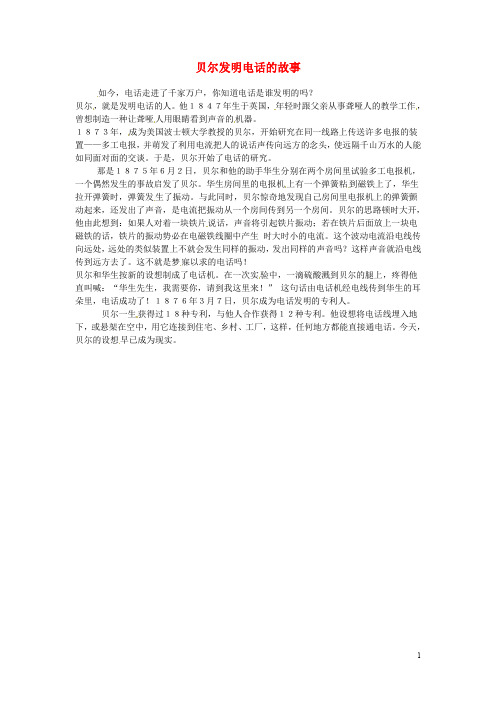
贝尔发明电话的故事
如今,电话走进了千家万户,你知道电话是谁发明的吗?
贝尔,就是发明电话的人。
他1847年生于英国,年轻时跟父亲从事聋哑人的教学工作,曾想制造一种让聋哑人用眼睛看到声音的机器。
1873年,成为美国波士顿大学教授的贝尔,开始研究在同一线路上传送许多电报的装置——多工电报,并萌发了利用电流把人的说话声传向远方的念头,使远隔千山万水的人能如同面对面的交谈。
于是,贝尔开始了电话的研究。
那是1875年6月2日,贝尔和他的助手华生分别在两个房间里试验多工电报机,一个偶然发生的事故启发了贝尔。
华生房间里的电报机上有一个弹簧粘到磁铁上了,华生拉开弹簧时,弹簧发生了振动。
与此同时,贝尔惊奇地发现自己房间里电报机上的弹簧颤动起来,还发出了声音,是电流把振动从一个房间传到另一个房间。
贝尔的思路顿时大开,他由此想到:如果人对着一块铁片说话,声音将引起铁片振动;若在铁片后面放上一块电磁铁的话,铁片的振动势必在电磁铁线圈中产生时大时小的电流。
这个波动电流沿电线传向远处,远处的类似装置上不就会发生同样的振动,发出同样的声音吗?这样声音就沿电线传到远方去了。
这不就是梦寐以求的电话吗!
贝尔和华生按新的设想制成了电话机。
在一次实验中,一滴硫酸溅到贝尔的腿上,疼得他直叫喊:“华生先生,我需要你,请到我这里来!” 这句话由电话机经电线传到华生的耳朵里,电话成功了!1876年3月7日,贝尔成为电话发明的专利人。
贝尔一生获得过18种专利,与他人合作获得12种专利。
他设想将电话线埋入地下,或悬架在空中,用它连接到住宅、乡村、工厂,这样,任何地方都能直接通电话。
今天,贝尔的设想早已成为现实。
1。
2023年选修八unit3知识点

Unit 3 Inventors and inventions 单元要点预览(意在让同学整体理解本单元要点)语言要点(模块)Ⅰ.词语辨析(意在提供完形填空所需材料)Ⅱ.词性变化(意在提供语法填空所需材料)Ⅲ.重点词汇(意在提供词汇综合运用所需材料)1.distinguis.辨别;识别;(常与from.between连用)区别;辨别[典例]1)..ca.distinguis.the.a..distance.从远处我能认出他们。
2).Th.ma.distinguishe.himsel.b.hi.wisdom这个人因智慧而扬名。
[重点使用方法]distinguish A from B 辨别A与B be distinguished from不一样于……be distinguished by 以……为特性be distinguished for 因……而著称distinguish oneself 显扬自己;使自己扬名[练习] 根据句子旳规定在括号里填入合适旳介词或翻译。
1).Ca.yo.distinguis.______.thos.tw.objects..2).Childre.shoul.b.taugh.t.______.______.______.______.(辨别好坏).3).Speec.distinguishe.huma.being.______.th.animals.4).Th.Chines.natio.i.distinguishe.______.it.diligenc.an.courage.Keys.1).betwee...2).distinguis.righ.fro.wron...3).fro.. 4).fo.2.convenien.adj.便利旳, 以便旳convenienc.n.便利, 以.convenientl.adv.便利地[典例]1).nex.Sunday.下个星期天你以便来吗?2)..can..se.hi.now.it..no.convenient.我目前不便见他.[重点使用方法]b.convenien.t.sb.对某人以.... I.i.convenien.(fo.sb.t.d.sth.(某人)做某事以便[练习] 根据句子旳规定在括号里填入合适旳词或翻译。
- 1、下载文档前请自行甄别文档内容的完整性,平台不提供额外的编辑、内容补充、找答案等附加服务。
- 2、"仅部分预览"的文档,不可在线预览部分如存在完整性等问题,可反馈申请退款(可完整预览的文档不适用该条件!)。
- 3、如文档侵犯您的权益,请联系客服反馈,我们会尽快为您处理(人工客服工作时间:9:00-18:30)。
The text tells the p______ of the snakes and roblem rocedures presents the p________ of catching them and applying foratent a p_____.
The purpose of the text is ____
v v
It’s always equipped in high buildings;
It looks like a small room;
v People
can go up and down in it instead of climbing steps.
lift /elevator
vIt
is a kind of make-up invented by French. v It smells good. vWomen especially like to use it. perfume
caught. I put a bowl with some jelly into fridge the_____ and prepared some ice-cubes. I made attempts three _______ and the last one succeeded. Pressed by my friends and relations, I decided seize patent to______ the opportunity to apply for a ______. The criteria are very strict. I have filled in the filed form and _____ my patent application. Now it’s a matter of waiting and hoping.
A.to show us how to trap the snakes but not to kill them B. to tell people how to apply for a patent of the writer’s new idea C. to introduce the writer’s new idea of trapping the snakes and her application for a patent D. to tell the readers how to get a new idea and make it a patent
水陆两用汽车
It’s an invention __________
Stephenson’s “Rocket”
a discovery It’s ___________
Mar.15 , 1493
The New Continent
When we speak of inventions, we the four can’t help thinking of great inventions in ancient China.
Read the passage quickly to find
the main idea of each part.
Part I (P1)
The requirement of getting a patent. The attempts to catch the snakes. The discovery of the problem of the snakes. The research on the approaches to solve the problem.
4. Testing the solution
5. Thinking of a creative solution 6. Deciding on the invention
Unit 3 The problem of the snakes
Skim the whole passage and get the main idea:
Do you know the stages eges every inventor must go through
1.Applying for a patent
2. Finding a problem
3. Doing research
4. According to the text, which subject do you think can be given a patent? A. A new star discovered by a scientist. B. A new novel written by Yao Ming. C. A new kind of grass found in a mountain which can be used as a medicine. D. A new way to make dirty water clean
Part II (P2-3) Part III(P4-6) Part IV (P7-8)
True or False
1. In this passage, the writer wants to encourage the readers to consider carefully the problems in daily life. 2. The writer was successful in catching the snakes in the ____ attempt. second
What’s the connection between discovery and invention?
lead to Discoveries often __________ inventions. Inventions are oftenbased on discoveries. _____________ The purpose of inventions is to make our life onvenient omfortable more c_________________ and c_________________
Unit3 Inventors and inventions
It’s ___________ a discovery
The structure of DNA (Called the double-helix) 双螺旋结构
an invention It’s __________
An amphibious car
Now, Let’s make a summary of the passage
When I called up my mother in the countryside, _______ she was upset. The reason was that snakes came now and then near the house ___________. My mother wanted me to help her and I agreed.
3. If you have a scientific theory or mathematical
model, you can get a patent(专利).
4. If your inventions pass the test, your application for a patent will be published 17 months from _____ the date you apply.
To choose the right answer
1. How did the writer catch the snakes? A. Using something to attract the snakes into a trap. B. Taking their habitat to another place. C. Cooling the snakes so that they became sleepy. D. All the above.
Can you name them?
compass
printing
gunpowder paper-making
Work out two rules:
An invention is something that is create by a human being. ______ d A discovery is merely making known something that alreadyexists _____ in nature.
distinguish I thought this was a chance for me to _________ set about myself. I ________ researching the habits of snakes and decided to cool them so that they would sleepy become_____ and could be easily
What are the three creative steps that the writer takes to catch the snakes without hurting them?
① to put the frozen bowl over the snakes’ in the morning habitat____________. ②to put the frozen bowl over the snakes’ in the evening habitat____________. ③to put the frozen bowl over the snakes’ habit in the evening and carry a net collect the snakes ___________ ____to without harming them the next morning.
